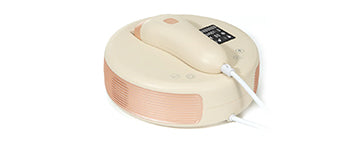Many people remove their armpit hair for personal hygiene, since the pit is supposed to be a natural catcher of sweat and bacteria that lead to body odor. Some might be concerned that it will grow too long and become seriously irritating, but armpit hair grows only up to a point and eventually stops as you age. Curious about how this happens or how you can slow down hair growth? We've got all the answers you need below.
Does Armpit Hair Eventually Stop Growing Longer?
The hair of the armpit stops at about a certain length, which is not that long. Actually, this is always the case with the different types of hair in each part of the body, whether it's scalp hair, eyebrow hair, arm hair, or even toe hair. Each has a growth cycle that determines how long it will go. For example, scalp hair grows to about a meter because it has a very long growth cycle. However, armpit hair has a very short cycle, so it only grows a few centimeters, mostly up to 2 to 3 inches.
Does Underarm Hair Stop Growing with Increased Age?
After some time, your underarm hair reaches its eventual termination of growth, predetermined by its length and age, both of which usually happen in your 50s. The best explanation for this is how armpit hair changes throughout a lifetime.
Childhood: This stage is characterized by minimal or practically no armpit hair. The hormones that trigger adult hair have not been activated, so the growth in most children is soft, fine vellus hair.
Puberty and Teenage Years: With the onset of puberty, there is a rise in the secretion of adrenal hormone, medically termed the adrenarche stage. The effect of the hormone then develops coarser and thicker hair in the armpits and the pubic area, replacing the earlier vellus hair that was formed.
Adulthood: During the 20s to 40s, most characteristics of axillary hair become quite stabilized regarding growth rate, length, color, and thickness. However, all these characteristics may be modified by hormonal changes brought on by pregnancy, various diseases, or medication.
Menopause: There is a significant decline from menopause in the levels of hormones that usually increase at puberty during the 50s. Because of this decline, armpit hair becomes thinner and grey as the hair loses its pigmentation.
Post-menopausal: In her 60s and beyond, she may even lose all armpit hair in the first place, usually if she is not on any type of hormone replacement therapy, to show indeed that with aging, underarm hair does stop growing.
Why Does Armpit Hair Cease Growing?
The growth of armpit hair stops due to the natural hair growth cycle. There are four phases in one hair growth cycle, which include:
Anagen is the growth phase of hair: The growth is active for a few weeks. This is genetically determined and sets the maximum length of hair.
Catagen: It is a transitional stage during which blood and nutrient supply to the follicles is withdrawn, due to which the growth of hair stops completely. It lasts for a few days only.
Telogen, or the resting phase, lasts for a few months. During this stage, there is a complete stop in hair growth.
The exogen phase is when shedding occurs, the old hair falls out, and new hair starts to grow.
This, therefore, explains why the armpit hair grows to a limited length due to the relatively short anagen phase compared to scalp hair, which may last for years. Besides, the hormones that stimulate hair growth decrease with age, thus further inhibiting armpit hair growth.
Regrowth Timeline: After removing it, armpit hair grows back faster when shaved, as one only cuts at the surface and is slower with waxing. In waxing, hair is pulled from its roots. It takes roughly about a month for armpit hair to grow up to an inch to its full length, up to 2-3 months; however, this may vary depending on hormonal and genetic aspects.
How Can You Prevent Armpit Hair From Growing?
Salon Laser for Armpit Hair Removal
Laser hair removal is a specialized in-salon treatment that is fairly expensive. It functions on the theory of selective photothermolysis, whereby light selectively targets only those areas that it needs to target without destroying surrounding skin and tissue. This light converts to heat when it reaches the hair roots, thus effectively destroying the follicles.
For the procedure to be effective, your underarm hair must be in a growing stage, or anagen phase. The heat either destroys the follicle or puts it into a resting phase, in which there is little hair growth. Count on 5 to 10 sessions, at 4 to 6 week intervals.
What to Consider for Laser Hair Removal:
Comfort Level: Slightly uncomfortable, as the armpit hair is relatively thick, and the skin around this area can be a bit sensitive.
Skincare: Proper care before and after sessions is most important if one wants to maximize the results and reduce discomfort to a minimum.
Follow-ups: Already after completing the rounds of initial treatment, follow-ups yearly may be necessary in order to hold the results. Gaining insight into these aspects will help in preparing for the sessions and make the experience smooth and long-lasting.
IPL Hair Removal Device at Home
IPL is ideally suited for the gentle removal of hair from the armpits. Working much in the same way as laser hair removal, it conveys light onto the hair follicles to reduce hair growth. For a better understanding of how IPL works out against salon laser hair removal treatments, refer to the comparison in the article Home IPL vs. Salon Laser Hair Removal: Which is Better?
The potential and recommended one is NAISIGOO The Shiner IPL Hair Removal. With several benefits, it's very effective at removing hair:
Achieve effective, safe, comfy hair removal at home, and achieve up to 12 months of smooth skin.
- Visible results after 4 sessions.
- Nearly painless, more effective, no black dots.
- Sapphire ice-cooling system, no burning skin.
- Narrower frame, fit for upper lip and bikini area.
- Professional safety certification, safety first.
Conclusion
Armpit hair growth is dictated by natural cycles that, peaking during puberty, often diminish after the hormonal change of menopause. Advanced hair removal involves professional laser hair removal treatments given in salons and home IPL devices. Long-term effectiveness with such procedures depends upon the destruction of hair follicles during the active growth stage and can be achieved with periodic repeat treatments. Understanding such options and their underlying biology in hair growth will go hand in hand with enabling the individual to choose the most appropriate method, yielding better results.






